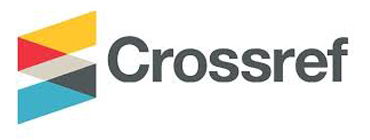TRACER STUDY: STRATEGIES FOR STRENGTHENING ACADEMIC PROGRAM IN THE 5.0 ERA
Abstract
Full Text:
PDFReferences
Alan Wilson, Valarie A. Zeinthaml, Mary Jo Bitner, & Dwayne D. Gremler. (2012). Services Marketing: Integrating Customer Focus Across the Firm. McGraw Hill Education.
Aldoory, L., & Toth, E. (2004). Leadership and Gender in Public Relations: Perceived Effectiveness of Transformational and Transactional Leadership Styles. Journal of Public Relations Research, 16(2), 157–183. https://doi.org/10.1207/s1532754xjprr1602_2
Allison Fine, & Beth Kanter. (2018, March 18). Using Technology to Make Work More Human. Harvard Business Review. https://hbr.org/2022/03/using-technology-to-make-work-more-human
Andres Diaz Lantada. (2020). Engineering Education 5.0: Continuously Evolving Engineering Education. International Journal of Engineering Education, 36(6), 1814–1832.
Burke, S., & Diazgranados, D. (2011). Team leadership: A review and look ahead. https://www.researchgate.net/publication/291048177
Craig E. Johnson, & Michael Z. Hackman. (2013). Leadership: A Communication Perspective. Waveland Press.
David Kirp. (2019). The College Dropout Scandal. Oxfors University Press.
Davis, M. H. (1994). Empathy: A Social Psychological Approach. Westview Press.
Hackman, J. R., & Oldham, G. R. (1976). Motivation Through the Design of Work: Test of a Theory. Organizational Behavior and Human Performance, 16(2), 250–279. https://doi.org/10.1016/0030-5073(76)90016-7
Herald Schomburg. (2016). Carrying Out Tracer Studies: Guid To Anticipating and Matching Skills and Jobs. International Labour Office.
Hirschi, A., Herrmann, A., & Keller, A. C. (2015). Career adaptivity, adaptability, and adapting: A conceptual and empirical investigation. Journal of Vocational Behavior, 87, 1–10. https://doi.org/10.1016/j.jvb.2014.11.008
Imam Gunawan. (2013). Qualitative Research Methods, Theory and Practice. Bumi Aksara.
Jaja Suteja. (2020). Menyoal Peran dan Eksistensi Alumni Perguruan Tinggi. https://www.researchgate.net/publication/342519881
Jones, T. M. (1991). Ethical Decision Making by Individuals in Organizations: An Issue-Contingent Model. The Academy of Management Review, 16(2), 366. https://doi.org/10.2307/258867
Julia T. Wood. (1997). Communitacion in Our Lives. Wadworth.
Kemdikbud. (2020). Peraturan Menteri Pendidikan dan Kebudayaan Nomor 22 Tahun 2020 Tentang Rencana Strategis Kementerian Pendidikan dan Kebudayaan Tahun 2020-2024.
Knight, J., & De Wit, H. (2018). Internationalization of Higher Education: Past and Future. International Higher Education, 1(95), 2–4. https://doi.org/10.6017/ihe.2018.95.10715
Komariah, Aan Satori, & Diam’an. (2011). Qualitative Research Methods. Alfabeta.
Lexy J Moleong. (2018). Qualitative Research Methodology. Remaja Rosdakarya.
Linda K. Trevino, & Katherine A. Nelson. (2019). Managing Business Ethics: Straight Talk About Gow to do it Right. In Personnel Psychology (7th ed., Issue 4). Wiley. https://doi.org/10.1111/peps.12360
Marciniak, J., Johnston, C. S., Steiner, R. S., & Hirschi, A. (2022). Career Preparedness Among Adolescents: A Review of Key Components and Directions for Future Research. Journal of Career Development, 49(1), 18–40. https://doi.org/10.1177/0894845320943951
McCall, M. W., Lombardo, M. M., Morrison, & Ann M. (1998). The Lessons of Experience : How Successful Executives Develop on the Job. Lexington Books.
Noddings, N. (2003). Caring: A feminine Approach to Ethics and Moral Education. University of California Press.
Peter F. Drucker. (2006). The Effective Executive. Harper Collins Publishers.
Peter G. Northouse. (2013). Leadership Theory and Practice. Sage Publications.
Poell, R. (2014). Workplace Learning Theories and Practices. In Human Resource Development (pp. 19–32). Macmillan Education UK. https://doi.org/10.1007/978-1-137-36133-2_2
Reason, J. (1990). Human Error. Cambridge University Press. https://doi.org/10.1017/CBO9781139062367
Ridwan Abdullah Sani. (2014). Pembelajaran Saintifik Untuk Impementasi Kurikulum 2013. Bumi Aksara.
Ron Dearing. (1997). Higher Education in the Learning Society. https://web.archive.org/web/20190105025759/http://www.leeds.ac.uk/educol/ncihe/
Sadeghi, A., Akmaliah, Z., & Pihie, L. (2012). Transformational Leadership and Its Predictive Effects on Leadership Effectiveness. International Journal of Business and Social Science, 3(7). www.ijbssnet.com
Salas, E., & Cannon-Bowers, J. A. (2001). Teamwork and Team Training. In International Encyclopedia of the Social & Behavioral Sciences (pp. 15487–15492). Elsevier. https://doi.org/10.1016/B0-08-043076-7/01436-4
Scherman, V., Howie, S. J., & Bosker, R. J. (2011). Constructing Benchmarks for Monitoring Purposes: Evidence From South Africa. Educational Research and Evaluation, 17(6), 511–525. https://doi.org/10.1080/13803611.2011.632663
Steve Taplin. (2022, May 27). Using Technology To Reduce Employee Turnover. Forbes Technology Council. https://www.forbes.com/councils/forbestechcouncil/2022/05/27/using-technology-to-reduce-employee-turnover/
Sugiyono. (2011). Metode Penelitian Kualitatif dan R & D. Alfabeta.
Suharsimi Arikunto. (2006). Prosedur Penelitian: Suatu Pendekatan Praktik. Rineka Cipta.
Thomas Bieger. (2024, January 29). The Role of Alumni in the Development of their University. Global Focus. https://globalfocusmagazine.com/the-role-of-alumni-in-the-development-of-their-university/
Toquero, C. M. D., & Ulanday, D. M. P. (2021). University Graduates’ Assessment of the Relevance of the Curriculum to the Labor Market in the Philippines. International Research in Education, 9(1), 19. https://doi.org/10.5296/ire.v9i1.17421
Tuckman, B. W. (1965). Developmental sequence in small groups. Psychological Bulletin, 63(6), 384–399. https://doi.org/10.1037/h0022100
Widyaningrum, A. Y. (2021). Kajian Tentang Komunitas Virtual: Kesempatan dan Tantangan Kajian di Bidang Ilmu Komunikasi. Jurnal Komunikatif, 10(2), 141–152. https://doi.org/10.33508/jk.v10i2.3457
World Economic Forum. (2023). Future of Jobs Report 2023. https://www3.weforum.org/docs/WEF_Future_of_Jobs_2023.pdf
Yukl, & Gary. (2013). Leadership in Organizatios (8th ed.). Pearson.
DOI: http://dx.doi.org/10.30829/tar.v31i1.4336
Refbacks
- There are currently no refbacks.

Jurnal Tarbiyah by UIN Sumatera Utara Medan is licensed under a Creative Commons Attribution-NonCommercial-ShareAlike 4.0 International License.
Based on a work at http://jurnaltarbiyah.uinsu.ac.id/index.php/tarbiyah.
Permissions beyond the scope of this license may be available at http://jurnaltarbiyah.uinsu.ac.id/index.php/tarbiyah/about/submissions#copyrightNotice.
















